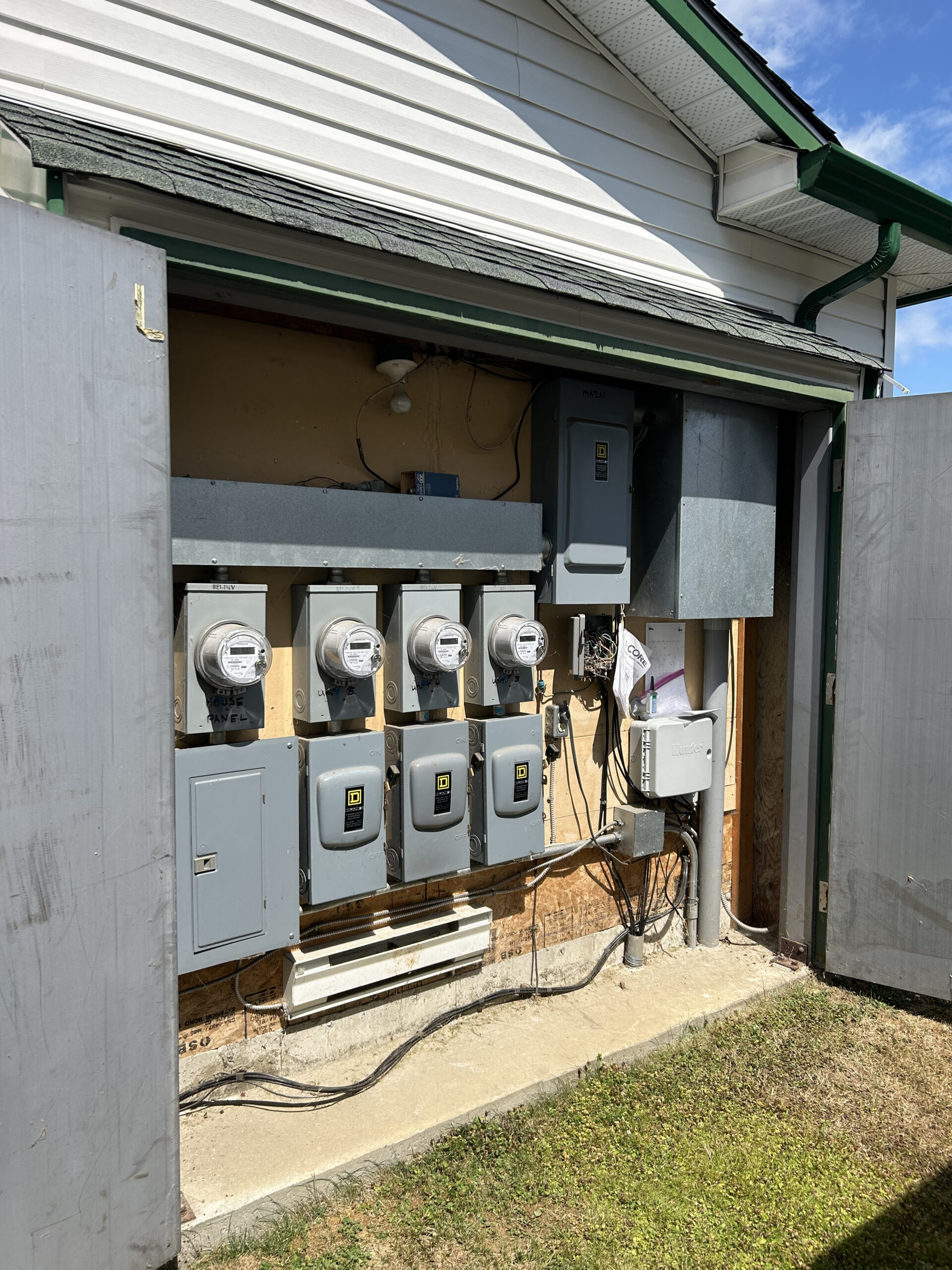Powering Up Safety: Your Essential Guide to Electrical Panel Upgrades in Nanaimo
Introduction
Is your home’s electrical system struggling to keep pace with modern demands? If you’re experiencing frequent circuit overloads, it might be time to consider an electrical panel upgrade. This essential guide will help Nanaimo homeowners understand when and why to upgrade, ensuring safety and efficiency in your home.
Signs You Need an Electrical Panel Upgrade
- Frequent breaker trips
- Unusual odors or crackling sounds from the panel
- Warm panel to the touch
- The home is over 20 years old, with an original panel
- Still using a fuse box (typical in pre-1960s homes)
Is your home’s electrical system struggling to keep up with the demands of modern living, leaving you wondering if it’s time for an electrical panel replacement? With the constant influx of new appliances and gadgets, it’s no surprise that your electrical panel might feel the strain. If you’re experiencing frequent circuit overloads, it’s a clear sign that your panel is no longer up to the task.
An electrical panel replacement can be an essential task, but it’s a necessary step in ensuring the safety and efficiency of your home. Outdated panels can lead to electrical shocks, fires, and other hazards, making upgrading to a modern panel that meets current safety standards essential. By doing so, you’ll avoid potential risks and ensure that your home can accommodate the increased power demands of modern living.
What is an Electrical Panel?
An electrical panel is the primary distribution point for electricity in your home and plays a vital role in powering your daily life. It serves as the switchboard for electricity, distributing power to individual circuits and ensuring that your lights, outlets, appliances, and devices function properly.
Here are some facts about electrical panels:
- Receives electricity from the utility company and powers your home
- Designed to prevent overload and reduce the risk of house fires by regulating the flow of electricity
- Critical for the safe distribution of electricity within your home and ensuring proper functioning of electrical systems
- It plays a pivotal role in managing power distribution, improving safety, and enhancing energy efficiency in your home
- Typically contains circuit breakers that trip in case of an overload, protecting your home from electrical hazards
Your electrical panel is the backbone of your home’s electrical system, and it’s essential to understand its role in keeping your home safe and powered.
Signs You Need to Replace Your Electrical Panel
The time to upgrade your electrical panel is looming if you’re experiencing frequent breaker trips, unusual odors, or other warning signs that your panel is no longer up to the task. You might wonder, ‘ What signs do I need to replace my electrical panel?’ If you’re noticing consistent tripping of breakers, crackling sounds, or warmth emanating from the panel, it’s time to take action.
These signs indicate potential safety hazards, such as electrical shocks or fires, which can be catastrophic. Additionally, if your home is over 20 years old and still has the original panel, it’s likely due for an upgrade.
Fuse box panels, especially in homes built before 1960, should be upgraded to modern circuit breakers for improved safety and efficiency. Ignoring these signs can lead to unexpected electrical panel replacement costs down the line.
Stay ahead of potential safety hazards and plan for a replacement to ensure your home or business remains safe and compliant with current electrical codes.
Common Electrical Panel Problems
If you’re experiencing frequent electrical issues, your panel is likely struggling to keep up with your power demands, and it’s not just an inconvenience – it’s a safety concern. Overloaded circuits can cause breakers to trip frequently, and old or damaged panels may not meet the power demands of modern appliances. Corrosion or rust on panels can indicate potential electrical issues, and neglecting these problems can lead to safety hazards like electrical fires.
Here is a breakdown of common electrical panel problems:
| Problem | Cause | Risk |
|---|---|---|
| Frequent tripped breakers | Overloaded circuits | Electrical fires |
| Dim or flickering lights | Insufficient power supply | Electrical shocks |
| Burning smells or sparks | Corrosion or overheating | Electrical fires |
| Outdated panels | Lack of modern safety features | Electrical shocks, fires |
| Inadequate panel sizing | Insufficient power capacity | Electrical fires, breakdowns |
Considering the importance of electrical panel replacements, it’s vital to identify and address these common problems. Doing so can ensure a safer and more efficient electrical system in your home. Remember, an electrical panel replacement can improve safety and efficiency, so don’t wait until it’s too late.
Types of Electrical Panels
Your electrical panel is the backbone of your home’s electrical system, and understanding the different types of electrical panels is essential for a safe and efficient upgrade.
You may be surprised to learn that there are several types of electrical panels, each with its characteristics and benefits. Circuit breaker panels are a popular choice for new installations, offering improved safety and efficiency. These panels use circuit breakers instead of fuses, providing better protection against electrical shocks and fires.
In contrast, fused panels, commonly found in older homes, rely on fuses to interrupt power in case of an overload. Upgrading to a circuit breaker panel can significantly enhance your home’s electrical safety and efficiency.
If you’re thinking about replacing a circuit panel, it’s vital to choose the right type of panel for your needs. With old electrical panels, it’s important to contemplate upgrading to a higher-amperage panel to support the increased electrical demands of modern homes.
Benefits of Replacing Your Electrical Panel
One significant advantage of upgrading your electrical panel is that it can increase your home’s capacity to support additional appliances and EV chargers. This means you’ll have the power to support your modern lifestyle without worrying about overloading your electrical system.
Upgrading your electrical panel also offers several other benefits, including:
- Future-proofing your home for technological advancements
- Enjoying the control, efficiency, and longevity benefits of new smart electrical panels
- Potentially qualifying for government incentives
- Enhancing your property value and providing reliable service for years to come
- Increasing your peace of mind, knowing your electrical system is safe and up-to-date
Electrical Panel Replacement Process
After weighing the benefits of upgrading your electrical panel, it’s time to explore the actual process of replacing it. This typically begins with shutting off power to the main electrical supply. This vital step guarantees your safety while the licensed electrician works on the replacement.
Next, the old panel is removed, and a new one is installed, which may involve rewiring circuits, adding new breakers, and ensuring proper grounding. The type of panel selected, such as circuit breaker or fused panels, can impact safety, maintenance, and cost. Top electrical panel brands, like Square D or Siemens, offer reliable and efficient options.
Once the new panel is in place, the electrician will test it to ensure all circuits function correctly. This thorough process, handled by a licensed electrician, assures a safe and compliant electrical system.
Hiring a Professional Electrician
When upgrading your electrical panel, hiring a professional electrician is essential to guarantee a safe and compliant replacement process.
They have the expertise to accurately assess your current electrical system to determine if an upgrade is necessary based on safety and efficiency considerations.
A professional electrician ensures that the upgrade process complies with local codes and regulations, reducing the risk of errors and providing a safe and effective panel replacement.
Costs and Considerations
- Standard 200-amp service upgrade: $1,000 to $2,000
- 300-amp or 400-amp upgrades: $2,000 to $6,000
- Factors affecting cost: panel type, amperage, labor rates, and additional work required
Maintenance Tips
- Regular inspections for wear and tear
- Keep the panel clean and free of dust
- Test breakers periodically
- Schedule annual professional inspections
Conclusion
Upgrading your electrical panel is crucial in maintaining a safe and efficient home. Don’t wait for an emergency – if you recognize any warning signs, consult a professional electrician in Nanaimo today. Invest in your home’s electrical future and enjoy the peace of mind of a modern, safe electrical system.




0 Comments